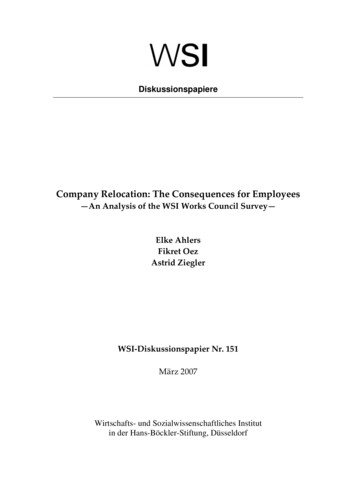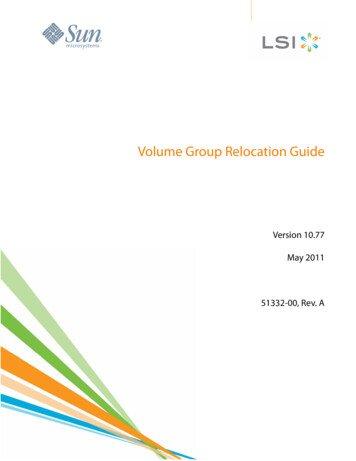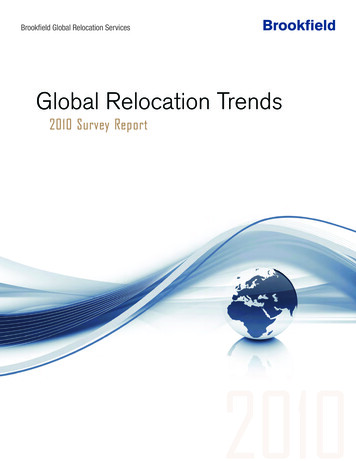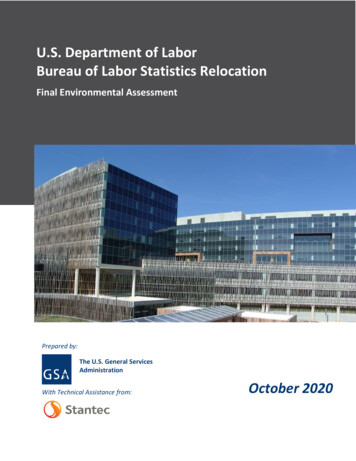
Transcription
DiskussionspapiereCompany Relocation: The Consequences for Employees—An Analysis of the WSI Works Council Survey—Elke AhlersFikret OezAstrid ZieglerWSI‐Diskussionspapier Nr. 151März 2007Wirtschafts- und Sozialwissenschaftliches Institutin der Hans-Böckler-Stiftung, Düsseldorf
In der Reihe „WSI-Diskussionspapiere“ erscheinen in unregelmäßiger Folge Arbeitenaus dem WSI zu aktuellen Vorgängen auf wirtschafts-, sozial- und gesellschaftspolitischem Gebiet. Sie basieren u.a. auf Vorträgen, die Mitglieder des Instituts gehaltenhaben oder auf gutachterlichen Stellungnahmen, können aber auch Diskussionsbeiträge zu ausgesuchten Einzelthemen sein. Für den Inhalt sind die Autorinnen undAutoren selbst verantwortlich.Dieses und andere WSI-Diskussionspapiere finden Sie als pdf-Datei unter:www.wsi.deGedruckte Einzelexemplare sind zu beziehen über Wirtschafts- und Sozialwissenschaftliches Institut in der Hans Böckler Stiftung (WSI i.d. HBS), Hans-Böckler-Str.39, 40476 DüsseldorfElke AhlersDr. Astrid ZieglerWSI in der Hans Böckler StiftungHans Böckler Str. 3940476 oeckler.deWSI-Diskussionspapiere (Print)WSI-Diskussionspapiere (Internet)ISSN 1861-0625ISSN 1861-0633II
DiskussionspapiereCompany Relocation: The Consequences for Employees—An Analysis of the WSI Works Council Survey—Elke AhlersFikret OezAstrid ZieglerWSI‐Diskussionspapier Nr. 151März 2007
4
Company Relocation: The Consequences for Employees —An Analysis of theWSI Works Council Survey—Contents:1. Introduction2. Findings of the WSI Works Council Survey2.1 The WSI Works Council Survey2.2 Empirical findings on relocation by company criteria2.3 Company relocation and the ramifications for employment and workingconditions in the company2.4 Significance of the Survey findings—the scope for generalisation3. The Political Framework3.1 What have been the policy reactions?3.2 An evaluation of the introduced measures4. The Relocation Debate: ConclusionsBibliography5
1.IntroductionAEG and Continental are just two recent examples that have placed the debate onbusiness relocation firmly back on the political agenda in Germany. Although bothcompanies work profitably at their German locations, shareholders have received highdividends, and employees have accepted massive cuts both in terms of incomes andworking time, production lines are being closed in Germany and moved to cheaperlocations abroad. In the public perception, these are not exceptions: There is animpression among many that the majority of German businesses are ready to leaveGermany sooner rather than later because, with its high wage costs and inflexible labourmarket, the country is no longer competitive as an industrial and business location giventhe conditions imposed by globalisation. This, in the public view, has most recentlybeen underscored by the consequences of the EU’s eastern enlargement and directcompetition with Central and Eastern European locations; moreover, given their closegeographical proximity to Germany, these new EU member states seem increasinglyattractive for German businesses.This theory is supported by, among others, followers of so‐called “bazar economy” (Sinn,2005), who see Germany’s future as a goods reloading point for cheap imports from low‐wage countries. According to this theory, therefore, Germany would soon simply tradeproducts produced in other countries. The counter‐argument, meanwhile, points outthat, on the whole, the German labour market would benefit from globalisation andeastern EU enlargement and that it was now paramount to put in place the necessary“structural change”, for if companies failed in competition at the European level, jobswould also be lost in Eastern Europe.For quite a number of years, regional economic research on company location1 hasfocused on business establishment and insolvency activity in Germany; interest inresearch on company relocation, particularly relocation abroad, has been fairly recent.In the regional economic debate, the activity of German companies abroad hasfrequently been considered from an economic policy viewpoint, in which theramifications for employees do not, as a rule, play a central role. The German Chamberof Commerce and Industry (DIHK), for example, surveys German industrial businesseson their intended foreign activity on an annual basis.According to the most recent DIHK survey (DIHK, 2006), German industrial companies’foreign investment remain high. Although the ratio of companies wishing to investabroad declined between 2004 and 2005, this was in contrast with increased investmentvolume in foreign locations.In addition to research focused on regional economic policy, there are, of course, further specialiseddisciplines that look at issues of location, company restructuring processes, etc. This is true in particular forsocial science research (cf. Behrens/Kädtler, 2006).16
The main problem in the debate on the consequences of relocation is that suchrelocations have both winners and losers. Many consider firms to be the winners andemployees the losers of globalisation. Given the liberalisation of international economicrelationships, companies are better positioned to make use of the advantages of the freemovement of goods and production, and will identify and select their business locationin the place that will provide the lowest costs and highest profits—regardless of theconsequences at home.The situation is different for employees. Given Germany’s massive labour marketproblems, for employees, job losses resulting from a company’s change of location implyunemployment. However, even if an announced relocation does not ultimately takeplace, employees still find themselves under pressure, as considerable concessions withregard to pay and working conditions are still all too often demanded of them.From an employee viewpoint, therefore, a critical review of this debate is long overdue.And until now, an examination focusing on the employee view of company relocationhas been sorely lacking. This is what this publication sets out to achieve.This study2, based on the 2005 WSI Works Council Survey, aims to highlight theramifications of company relocations on employees as well as the role of companyrelocation in the work of the works councils. The study is rounded off with an analysisof the policy framework, which looks at how policy has reacted to the public debate oncompany relocations. Concluding comments complete the study.2.Findings of the WSI Works Council Survey2.1The WSI Works Council SurveySince 1998, the WSI has conducted representative nationwide surveys of works and staffcouncils. Every two years since then, some 2,000 works councils are surveyed oncompany developments, wage policy, and employee representation. The surveyincludes companies with works council representation, includes all industrial sectorsand size ranges, from a minimum of 20 employees.3 The aim of the survey is to obtainrepresentative data on company trends and developments from a works councilviewpoint (Schäfer, 2005). The findings are therefore particularly relevant for companieswith works council representation but, given that about half of all employees inGermany are employed in companies with works council representation, the WSISurvey covers a large proportion of the employed workforce.This study presents central project findings; the long version is published in Ahlers et al., 2007.In the analysis, data was weighted by companies’ size range, industrial sector as well as location (i.e., Eastor West Germany), so that they could be representative for the basic totality of all businesses with workscouncils.237
The 2005 Survey was the first to include the topic of relocation. Questions here soughtto gather information and experience on the relocation debate in German businessesfrom the view of works councils. After gathering general information on the debate incompanies, e.g., whether a company had held relocation talks or whether a change oflocation had already taken place, additional questions sought to obtain information onchanging working conditions in the context of relocation negotiations.The questions in the section of the Survey on company relocation can be found in Box 1.Box 1:Extracts from the questionnaire of the 2004/2005 WSI Works Council Survey onrestructuring/relocation Has your company undergone any operational restructuring sincethe beginning of 2003?Is relocation an issue in your company?Have any parts of the company been relocated since the beginning of 2003?Did the relocation .take place within Germany or move abroad?Which business areas were affected by the relocation?(production, research and development, sales and distribution, or other areas)Is production or any other part of the company likely to change location within thenext two years?Will the relocation of the company’s production, or other company areas, takeplace within Germany or move abroad?Are talks on relocation currently being held?If so, is relocation to take place within Germany or to move to a location abroad?Is the effected or threatened relocation having a negative effect on workingconditions?For example, has company working time been extended, or will it be extended?By how many hours/week has working time been extended/will it be extended?Has the works council had to make other concessions with regard to working time?What were these?For example, have concessions been made or agreed with regard to wages andsalaries?Were these cuts in current wages/salaries, allowances, annualbonuses, holiday pay, premiums, bonus payments or any others?Has relocation been reversed to return to your company’s original location?The findings of the WSI Survey are presented in two sections. The first examines thetypes of companies that have been confronted with relocation during the survey period.Based on the Survey’s results, the second section looks at the ramifications of relocation8
for the company. Our aim was to see the effects of relocation on employment andworking conditions.2.2Empirical findings on relocation by company criteriaSince 2003, 50% of all of the companies surveyed have experienced restructuring. Achange in location—i.e., the relocation of an entire company or individual parts of acompany elsewhere—is one facet of the operational restructuring process.In 16.2% of the surveyed companies with works council representation, “relocation” isan issue. It is important to note that this figure includes both internal company talks onthe possibility of relocating as well as relocations that have been carried out, However, itis necessary to separate out whether the possibility of relocating has been merelydiscussed in a company or whether it has actually taken place: Of all the companies thathave held talks on relocation (i.e., 16.2%, or n 324), about half did relocate (57.4%, or9.2% in total; see Figure 1). In the remaining companies, relocation has remained asubject for debate, implying that internal company talks on relocation do not necessarilylead to relocation. It is assumed that, in announcing relocation, employers also pursueother goals (cf. also 2.3).It is useful to consider the incidence of relocation talks and actual relocations from adifferentiated empirical angle. An initial assumption would be that there are differencesbetween East and West Germany. The consideration that West German companiesmanufacture economically well‐positioned export goods would suggest that relocationsin West Germany are more discussed and implemented more readily. Indeed, theempirical findings confirm this assumption: there is greater emphasis on relocation talksin West Germany than in East Germany (17% and 12%, respectively), and relocations areimplemented slightly more rapidly than in East Germany (58% and 52%, respectively).In a sectoral comparison, there are also considerable differences between relocation talksand effected relocations. Thus one might assume that manufacturing industry—alabour‐(cost)‐intensive industrial sector—is likely to be keen to find cost‐effectiveproduction locations; moreover, such companies will also be keen to tap new marketsabroad (cf. also Kinkel et al., 2004). In the trade and construction sectors, meanwhile,companies will want to keep their location close to their markets, and are thereforeunlikely to contemplate a long‐distance relocation or a move abroad.As Figure 1 shows, talks on whether to relocate vary very strongly within the variouseconomic sectors. As assumed, investment and consumer goods firms top the list, withsome 35% affected by talks on relocation. Companies in the banking and insurancecompanies sector come a very close second (33%). Nevertheless, there are also sectors inwhich there has been virtually no relocation debate or implementation, such as, forinstance, in trade (6%) or construction (8%).9
Figure 1:Is relocation an issue in your company?Works council responses, in %16Total919Raw materials/industrial goods935Investment and durable goods2326Consumer goods148ConstructionTrade (and repairs)26121Transport and Communications1433Banking and InsuranceOther private and public services2231Relocation talksEffected relocationSource: WSI Works Council Survey, 2004/2005Further aspects, such as company size or economic position, also influence decisions oncompany location.Kinkel et al. (2004) show that, in the area of manufacturing, the proportion of businessesthat relocate production rises with increasing business size; nevertheless, current studiespoint to the fact that a considerable share of the most recent relocation activity has comefrom small and medium‐sized enterprises (SMEs) (e.g., Meardi, 2006). According toLungwitz et al. (2007), German SMEs have systematically expanded their cooperativerelationships into Central and Eastern Europe since 1990. Especially “furniture andclothing businesses, very typical SME branches, represent the classic example ofcooperation between German SMEs and Central and Eastern European partnercompanies with a view to lowering costs” (ibid).The empirical findings of the WSI Works Council Survey confirm these trends (Figure 2):although relocation is considered and discussed in both small and large companies,large enterprises—especially those with more than 1,000 employees—make up thegreater share (44%). The discrepancy between relocation talks and actual relocations iswide in all company size ranges. Noticeable, however, is the higher‐than‐average shareof effected relocations in small businesses: during the surveyed period, 11.2% had10
contemplated relocation—and virtually all had also undertaken it. In the case of largecompanies, about half of all businesses had relocated.Figure 2:Extent of relocation talks and effected relocationsWorks council responses, a comparison11,210,720 ‐ 49 employees50 ‐ 99 employees100 ‐ 199 employees200 ‐ 499 employees17,57,66,516,71024,527,1500 ‐ 999 employees13,3441,000 ‐ 1,999 employees2044,4more than 2,000 employeesTotal22,216,29,3Relocation talksEffected relocationSource: WSI Works Council Survey, 2004/2005The economic position of relocating companies is also highly significant. This is trueboth for companies that relocate to save costs as well as for those that relocate to openup new markets as sufficient capital is required to relocate in both scenarios. This wouldimply that businesses with a less‐than‐positive economic position might not be in aposition to “afford” to relocate.The Survey results show that businesses contemplating relocation do tend to be well‐placed economically speaking (Figure 3). Eighty‐two percent of the surveyed companiesconsidering relocation describe their economic situation as “good” or even as “verygood”. They are comparatively better off than those companies not envisagingrelocation. Only 17% (of which 15% consider their economic situation to be “less good”situation and 2% consider it to be “bad”) of all companies contemplating relocation arenot well‐placed economically. It therefore seems that German companies do not moveabroad out of economic necessity but, rather, one assumes, to further secure, or evenimprove, their economic position.11
Figure 3:Economic position of companies in relocation talks and those not contemplatingrelocation—A ComparisonWorks Council responses, in %2815198270Holding relocation talksRelocation not contemplatedgoodLess goodBadSource: WSI Works Council Survey, 2004/2005Only in the rarest cases are entire companies closed down in one place and re‐builtelsewhere. Based on the WSI Works Council Survey, the chart below (Figure 4)illustrates those parts of companies that have relocated since the beginning of 2003. Asexpected, production was the business area relocated in most companies, whereasresearch and development capacity is least affected by relocation. A sectoralcomparison, however, shows up considerable differences. Industrial companies aremost likely to move their production, but in nearly all economic sectors, companies’sales and distribution departments are also relocated. Here it is striking to note that, inaddition to companies in the transport and communications sectors, those in bankingand insurance also demonstrate a massive outsourcing of sales and distribution services.In the public debate, relocation is frequently equated with the relocation of Germanbusinesses abroad. The WSI Survey findings make clear that relocation abroad is, in fact,limited, since (only) 28% of the companies surveyed who had relocated, had movedtheir operations abroad. Indeed, 72% of the firms surveyed had relocated domestically.In his study on the distribution, background and economic effects of companyrelocations, Maaß (2004) comes to a very similar conclusion. Based on the Statistics ofbusiness notifications, he shows that, in the case of companies in North‐Rhine12
Westphalia, a growing, but until now only a small proportion, of companies has movedabroad.Figure 4:Which company areas are affected by relocation?(multiple answers provided by works councils, in %)TotalInvestment and durable goods738316882657231Transport and communications1284976411245Trade (and repairs)Other private and public insurance1349Consumer goodsBanking and insurance2668Raw materials/Industrial goodsConstruction35314ProductionResearch and developmentSales and distributionSource: WSI Works Council Survey, 2004/2005Nevertheless, in a sectoral comparison the WSI Survey does show considerabledifferences. While companies in the raw materials and production goods industriesprefer to move abroad (52%), and with consumer goods, investment and durable goodscompanies also showing a tendency to relocate outside Germany, companies in all othersectors prefer to relocate domestically (see Figure 5). It could be said that, overall,industrial companies relocate abroad to a much greater degree than services companies,although the data provides no information on the extent of the regional radius (both interms of international and domestic relocations). The WSI Survey did not, in fact, askwhether, in the case of international relocation, companies moved to the new Centraland Eastern European EU member states, or as far afield as China and India, or whethercompanies relocated to the region immediately surrounding them or to another federalstate.The relocation ratios, separated out for domestic and foreign relocations, vary markedlybetween company size and situation. In East Germany, at 78% of all planned relocations,the trend to relocate within Germany is considerably higher than in West Germany, so13
that it would be feasible to assume that domestic relocations tend to be between citiesand surrounding areas.Figure 5:Effected Relocations, domestic and international(Works Council responses, in %)TotalRaw materials/Industrialsgoods5247Investment and durablegoodsConsumer goods287236644258Trade (and repairs)1387Banking and insurance397Other private and publicinsurance694Relocation within GermanyRelocation abroadSource: WSI Works Council Survey, 2004/2005The company size comparison makes clear that the trend to relocate abroad does notnecessarily increase with company size, as stated above. In fact, medium‐sized business,with between 100 and 199 employees, tend to be drawn abroad (see figure 6).In terms of relocated company areas, there are considerable differences betweenrelocations abroad and those within Germany. International relocations seem to befavoured for inexpensive production (see Figure 7), given that 86% of all internationalchanges of location involve production.However, relocation is not always the right decision—or a lasting one. Thus 7% ofsurveyed companies holding talks on relocation have reversed an already implementedrelocation. However, in general such a return to the original location tends to take placeif the original relocation had occurred within Germany.14
Figure 6:Relocation—where? Works Council responses, in %Total7228West Germany7228East Germany73271‐49 employees89250‐99 employees100100‐199 employees5644200‐499 employees4357500‐999 employees33671,000‐1,999 employees3761more than 2,000 employees793Within GermanyAbroadSource: WSI Works Council Survey, 2004/2005Figure 7:Relocated Company Areas, Works Council responses, in %Relocation abroadRelocation within GermanyProduction8623220Reserach and developmentSource: WSI Works Council Survey, 2004/2005152255Sales and distributionOther10
Having outlined the most important survey findings on the extent of relocation, andbefore outlining the consequences of the relocation debate for companies, here is a briefsummary of the main points: 2.3There are major differences with regard to the extent of envisaged (threatened) andactually effected relocations.In manufacturing industry—particularly in investment and durable goodscompanies—the extent of relocation talks, and implemented relocations, is higherthan average.Most relocation takes place within Germany. Twenty‐eight percent of the companiesthat relocated between 2003 and 2005 went abroad.The economic position of those companies that have held relocation talks has shownitself to be extremely stable, so that the WSI’s empirical findings on relocationpresented here provide a differentiated view.Company relocation and the ramifications for employment and workingconditions in the companyCompany changes of location tend to go hand‐in‐hand tend with consequences for theiremployees. The precise consequences depend on the reasons for which a company haschanged location. Fewer drastic ramifications are likely in those companies that relocateto develop new markets because, in such cases, the prime concern is a question offinding new markets—and in an ideal scenario, the consequence of that might be astabilisation of both the company and the location. If relocation is implemented forreasons of cost, it is feasible to assume serious cutbacks in employment and workingconditions, since the main aim is to cut costs in the home location. Talks on relocationconducted with a view to cutting costs primarily serve to exert pressure on employees.The company’s threat potential is, above all, that of cutting jobs. Employees tend toreact to such pressure by agreeing to concessions in terms of working time and pay.Company relocation can therefore have both positive as well as negative consequencesfor employees, an ambivalence confirmed by the WSI Survey. Indeed, in most of thecompanies with threatened or implemented relocation, employment has been bothincreased and cut back. This is illustrated by works council responses to the question onemployment trends in the period 2003‐2005 (see Figure 8). Sixty‐one percent of theworks councils concerned indicate a fall in employment in their companies duringrelocation talks (in comparison: during the same period, employee numbers fell in 49%of those businesses that conducted no relocation talks).This implies that relocation talks—regardless of whether these are then transformed intorelocation or not—often go hand in hand with employment cutbacks within the firm. Ofthose companies that implemented a change of location, 68% cut employment.16
According to a study by the European Foundation for the Improvement of Living andWorking Conditions (2006) employees with lower qualifications tend to be most affectedby job cuts resulting from relocation. Since the business areas that are relocated tend tobe people‐intensive, competition for remaining jobs is intense. As a result, in light ofrelocation, jobs previously considered safe may become increasingly precarious andunsafe. And this could intensify pressure on working conditions.Figure 8:Employment trends in company talks on relocation—A ComparisonWorks council responses, in %2923302012162021615149TotalCompanies not holdingrelocation talksFallCompanies holdingrelocation talksNo change68Companies withimplemented relocationIncreaseSource: WSI Works Council Survey, 2004/2005In a sectoral comparison, the fall in employment—in instances where discussions onrelocation were conducted—is not uniform. Developments in companies in the rawmaterials and manufacturing industries (37.5%) and trade (45.3%) are comparativelypositive. A stronger fall in employment is evident in businesses in the transport andcommunications sector (67.7%) as well as in banking and insurance (69.2%).On the whole, jobs were cut in 68% of companies that did relocate. This ratio is more orless applicable across all economic sectors—sector‐specific subtleties are not discussedhere given the low number of those surveyed.As already mentioned, 28% of companies that changed location moved abroad. In mostcompanies, this relocation went hand in hand with a reduction in employment (71.2%).Thus, these companies demonstrate a more frequent fall in employment (see Table 1).17
Overall, the data shows that, in most cases, relocation (both threatened and effected)goes hand in hand with job cuts. The quantitative extent of such job losses remainsunclear, however, since the WSI Survey does not provide information on redundanciesand employment.Table 1:How has employment developed since the beginning of 2003?(Works Council responses, in %)Total (all companieswith effectedrelocation)Relocation withinGermanyRelocation nt has risenNo changeEmployment hasfallenSource: WSI Works Council Survey, 2004/2005Not only does a company’s change of location lead to job losses, it may also influenceworking conditions within the company. The WSI Survey findings clearly indicate thatemployees’ working conditions have deteriorated both in many companies that havecarried out relocation as well as in those that have threatened to do so (see Table 2): inalmost 47.8% of all businesses that held talks on relocation, working conditionsdeteriorated during the course of the “negotiations”. In cases where the relocation didthen take place, working conditions deteriorated in 48.9% of all businesses—and in thosecases in which, ultimately, relocation either did not occur, or had not (yet) beenimplemented at the time of the survey, this figure stood at 46.4%. In a sectoralcomparison, the works councils in consumer goods, transport and communicationcompanies indicated a higher‐than‐average deterioration of working conditions. Thisimplies that the threat of relocation has almost the same effect on working conditions asthe actual relocation itself.Working conditions deteriorate primarily in terms of working time and pay (see Table 3).Thus 20.5% of all works councils who, in the course of relocation talks, had to acceptworsening working conditions for their employees, report cuts in wages and salaries,while 17% report extended working time. If one breaks this down by firms that haverelocated and those that have not yet done so, it becomes evident that employers haveeven pushed through wage cuts and extended working time in cases where relocationwas “merely” threatened. This implies that, ultimately, implemented relocationworsened working conditions less frequently than the mere threat of one.In terms of cuts in salaries and wages, this primarily concerns cuts in allowances andsupplementary pay (e.g., premiums, bonus payments ( 44%); allowances ( 37%), etc. In18
29% of affected businesses, however, cuts have also been made in regular salaries andwages. With regard to working time, most of the works councils (46% in West Germany,59% in East Germany) noted an extension of weekly company working time by twohours.Table 2:Have working conditions deteriorated?Works council responses, in %4Share of companies whose workscouncils were involved with the issueof relocation of this, the share of companies thathave not relocated the share of companies that haverelocated Of this, the share of companies thatrelocated domestically and the share of companies thatrelocated abroad.Share of all workscouncils surveyedYesNo16.247.841.442.557.5 (100%)72.146.448.943.539.952.931.627.8 (100%)38.561.5Source: WSI Works Council Survey, 2004/2005Table 3:The deterioration of working conditions—salaries, wages and working time—in thecase of threatened and/or effected relocation:(Works council responses, in %)Total of which:relocation of parts ofcompany has takenplace of which:relocation of parts ofcompany has nottaken place47.8% of which: salary andwage concessions20.5% of which: extension ofcompany’s working time17.0%58,7%15.0%6.9%41,3%28.5%31.4%Source: WSI Works Council Survey, 2004/2005It is possible to surmise that, in these companies, more company‐level agreements tosecure employment would have been agreed or that opt‐out clauses in the collectiveWhere percentages do not add up to 100, the differential can be explained by “No Answer” or “Don’tknow” answers in the questionnaire.419
wage agreement were applied. This would mean that, with the agreement of employersand works councils, possible concessions with regard to employee wor
change in location—i.e., the relocation of an entire company or individual parts of a company elsewhere—is one facet of the operational restructuring process. In 16.2% of the surveyed companies with works council representation, "relocation" is an issue.










